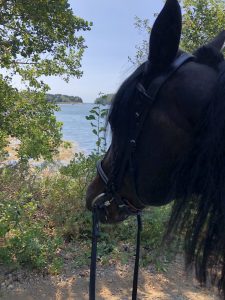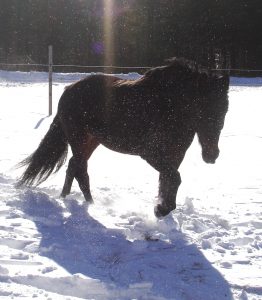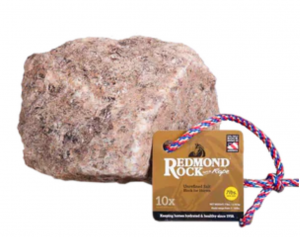Editor’s Note:
This week, we hear from Debbie Hight. She is a BHPS board member, horse owner, and occasional guest columnist for Cayuse Communications. She writes from her home in Maine, where she is caring for dogs and horses, especially her lovely Morgan mare, Roxy, who was a demonstration horse at the Summit in Maine in 2019. She writes about hind gut concerns and has been lent a hand by Dr. Sheryl King.

Roxy and Debbie explore the Maine coast
Debbie writes:
Spring is here! Along with the saying goodbye to heated water buckets, shedding coats, and mud, I look forward to the end of my 25 year-old mare’s hind gut issues, less romantically called, the “squirts.”
Squirts have been happening for the past three winters, when I would see a change to looser manure and the occasional “squirting” of liquid. The first year, I blamed it on her taking a bite of the decorative bittersweet. My vet thought otherwise and told me that in older horses, the hind gut is not as efficient.
Fecal Water Syndrome or Cushings Disease have been ruled out.
It’s just the squirts.
Horses seem to be unbothered unless it affects tails or skin, my vet said. I shared that my mare drank more water and licked more salt in the winter, and the vet simply explained that my mare was replacing fluids and minerals.
Come spring, the issue magically disappears.
Best Horse Practices

Roxy in the winter
My involvement with the Best Horse Practices Summit and its focus on science made me curious about this annual phenomenon. Fellow board member, friend, and annual speaker at the Best Horse Practices Summit, Dr. Sheryl King is an expert in animal physiology, so I contacted her for help in trying to understand it. Sheree earned her PhD in 1983 at the University of California at Davis and enjoyed a long and successful career at Southern Illinois University in Carbondale. She knows her stuff and is easy to talk to. A regular google search sent me to supplement companies, so I asked Sheree to help me with a scholarly search. I still found scant information.
Since I am sure that there are many horses with the same condition, I am documenting my experience with Sheree’s help. (Sheree did send me an article, “Older Horses and Chronic Diarrhea in the Winter“.
Summary of the issue
The problem begins in November. I was advised by my vet to try probiotics, so I have used Platinum Performance Balance, which contains pre- and pro-biotics. This year, I jumped on it and started giving it to her at the first sign of trouble. It didn’t seem to help much, so I increased to twice a day. Things improved.
I backed off to once a day thinking things were settling down, but I was wrong and returned to twice a day.

Debbie Hight (center) and the rest of the BHPS board. Dr. King is at right.
Sheree and I explored Roxy’s history and diet:
1. Roxy reportedly had a brief and mild case of laminitis before I bought her at age 6. Because she is a Morgan mare who would likely eat until she blew up, I’ve managed her diet very carefully for the past 19 years.
2. She is rarely on pasture and spends her time in a paddock that has an occasional sprig of green. She has become very flexible with her neck and can reach under the fence line for any additional sprig of green without being zapped. Those sprigs disappear in November and don’t reappear until late April.
3. Roxy is fed no grain and has a quarter cup of hydrated oatmeal every morning with a scoop of Quiessence (a magnesium-based product that she got before I bought her and which I have continued) Platinum Performance Balance in the winter and a Platinum Antioxidant.
I know that Best Horse Practices Summit eschews supplements as unnecessary and expensive. However, when she was 15, she twice had a histiocytoma removed from her girth line and she also developed another “bump” in another location. Whether the absence of additional bumps is due to the addition of the antioxidant supplement or just plain luck, I am unwilling to challenge.
4. She gets a flake of first crop hay in the morning, one at lunch if I am at home, one when she comes in late afternoon, and part of one at night. My hay is organic and comes from my fields. I put away both first and second crop every summer and have it analyzed occasionally. The values remain fairly constant.
 During the summer, Roxy might get a little second crop. But I have noticed that her manure tends to be more solid on a steady diet of first crop, much to her disgust. In the analysis, the crude protein, on a dry basis, is 10% in first crop and 15% in second. The simple sugars are 6.5% (first) versus 7.2% (second). There are some differences in the detergent fibers as well.
During the summer, Roxy might get a little second crop. But I have noticed that her manure tends to be more solid on a steady diet of first crop, much to her disgust. In the analysis, the crude protein, on a dry basis, is 10% in first crop and 15% in second. The simple sugars are 6.5% (first) versus 7.2% (second). There are some differences in the detergent fibers as well.
5. The summary of her diet is that it is constant year-round, with an occasional 30 minutes of pasture in the summer.
6. We typically ride in the arena or trail ride or walk in the fields about 6 days a week.
7. The change to heated water buckets does not correlate to the timing of the looser manure.
8. She is de-wormed in October and April.
9. She sees the equine dentist every summer and her teeth have never been an issue.
10. She is tested periodically for ACTH and Insulin, all continuing within the “normal” range.
I called Platinum Performance to see if they had any resources or research on the hind gut issue. No, but she did have another product that might help! Of course. So, I bought a month’s worth of Platinum Performance G, and added that to the mix. It did not help. It did not hurt.
Salt
I shared my non-progress with Sheree. I told her how much Roxy liked the salt block. She said more salt equals more water equals runnier manure. So, I removed the salt block for two weeks and her manure became more solid. But horses need salt, so she now gets it for about 4 hours a day. I also noted that she prefers the white processed salt, so I put Redmond Rock salt in her stall to limit her salt habit. She licks it and drinks quite a bit of water. She’s always been a terrific water drinker.
Sheree also wondered if eating hay off of a snow covered paddock would deprive Roxy of nutrients that came with the soil during non-snow months.
Salt and increased water intake seem to be factors, but why would she feel the need to eat more salt in the winter?
Summary
We are on the cusp of spring and more solid manure. I will soon be backing off on the probiotics to once a day and monitoring results.
Thank you to Dr. Sheryl King for her friendship and insights. The experiment and observations will continue next winter.
Thank you to Best Horse Practices for creating a critical eye when it comes to supplements.
Thank you to Roxy, my patient and kind horse, for teaching me, forgiving me when I make mistakes, and providing me with an interesting problem.
Well, you know that magnesium is a laxative, right? I’ve had 3 horses over my life time that would occassionally scour, mostly on alfalfa hay. I’m not a vet, but it seems to me that you could be heading for Crohn’s Disease. Liquid Pink Bismuth, the 1/2 pint size, will kill H. Pylori, a frequent culprit of ulcers. My gut feeling is (pardon the pun) that this horse is getting too much processed supplements. Are you racing ? Eventing? Endurance riding? I suggest slowly changing your feeding program to a high quality grass hay, whatever she’ll clean up in about an hour, a special ‘senior horse’ complete feed, and 30 min.’s a day of hand grazing, if her teeth will permit. Symptoms don’t always manifest where the cause is. I have old horses too, my youngest is 19, my oldest 32.